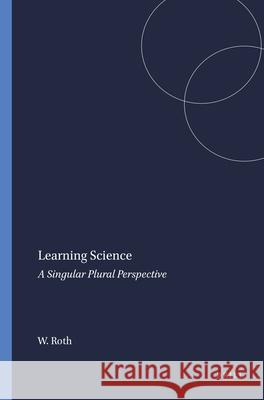Learning Science : A Singular Plural Perspective » książka
Learning Science : A Singular Plural Perspective
ISBN-13: 9789077874257 / Angielski / Miękka / 2006 / 372 str.
Roth continues his long-standing interest in understanding how one learns science and the question of why all the changes to science education made over the past five decades have a significant impact of increasing understanding and interest in the subject. (Education/Teaching)
How do you intend (to learn, know, see) something that you do not yet know? Given the theory-laden nature of perception, how do you perceive something in a science demonstration that requires knowing the very theory that you are to learn? In this book, the author provides answers to these and other (intractable) problems of learning in science. He uses both first-person, phenomenological methods, critically analyzing his own experiences of learning in unfamiliar situations and third-person, ethnographic methods, critically analyzing the learning of students involved in hands-on investigations concerning motion and static electricity. Roth continues his longstanding interest in understanding how we learn science and the question why all the changes to science education made over the past five decades have a significant impact of increasing understanding and interest in the subject. Roth articulates in his concluding chapter that the problem lies in part with the theories of learning employed-in the course of his biographical experience, he has appropriated and abandoned numerous theoretical frameworks, including (radical, social) constructivism, because they fell short when it came to understand real-time processes in school science classrooms. This book, which employs the cognitive phenomenological method described in the recently published Doing Qualitative Research: Praxis of Method (SensePublishers, 2005), has been written for all those who are interested in learning science: undergraduate students preparing for a career in science teaching, graduate students interested in the problems of teaching and learning of science, and faculty members researching and teaching in science education.











